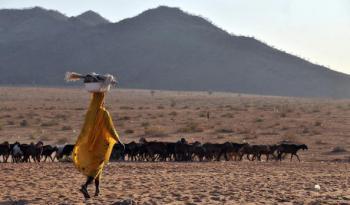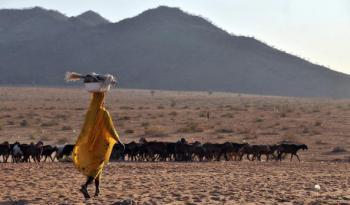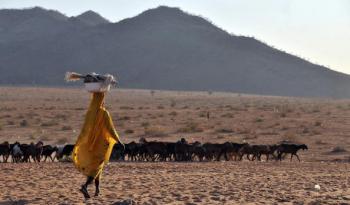These carbon-negative projects are successfully linking with local governments and the private sector to stimulate sustainable initiatives. One potential area is for the carbon credit market to fill the gap via carbon offsetting, connecting the developed world’s emissions with solutions for those most at risk from the impact of global warming.
Solar Cookers
In West Africa, many households spend over 25 per cent of income on cooking fuel while others travel for hours to chop down firewood. Some governments subsidise bottled cooking gas, but solar cookers are becoming part of the real solution. Presently, SCI’s largest project involves three Darfur refugee camps in Chad where women have manufactured over 30,000 cardboard and foil ‘Cookits’, reducing firewood trips outside the camp by 86 per cent.
In 2005, the tsunami-damaged Somalian fishing village of Bender Bayla became the world’s first solar cooker village, thanks to Sun Fire Cooking. The charcoal trade there is the biggest threat to pastoral life, not drought or the civil war. While reducing household fuel consumption, solar stoves also improve child and maternal health. According to the World Health Organisation (WHO), half the world’s population uses solid fuel—usually wood, charcoal or dung—for household energy, causing indoor pollution and 1.6 million deaths annually, with pneumonia the leading killer of children under five.
Senegalese women, trialing solar stoves in 2008, reported immediate benefits such as clean air, sterilised water and utensils, and better tasting food. Improved finances from reduced kerosene consumption and more time for profitable activities like sewing clothing to sell rather than collecting firewood were also noted. Other benefits include: safety, particularly for children; greater nutrition due to lower cooking temperatures and no burning; cooking nutrient-rich legumes despite the longer times required; and quicker cleaning with less washing water collected. Gender inequality is also avoided in countries like Tibet where young girls collect firewood while the boys attend school.
Biochar
Produced from a growing range of biomass fuels without harvesting trees—from nut shells to animal waste, bamboo and used vegetable oil—biochar generates syngas and bio-oil for cooking and heating while its co-product is applied to soils with many carbon sequestration benefits such as increased bio-available water and organic matter, enhanced nutrient cycling, and reduced leaching. Allowing them to cook on a gas flame as in “modern” kitchens, users can maintain cooking customs without environmental damage.
World Stove has several pilot projects making biochar technology available in Africa. Their large institutional stove, the Biucchi, is being used in women’s shelters and schools in several countries including Burkina Faso. As with solar cookers, indoor pollution is avoided and jobs can be created with small locally owned shops producing stoves specifically altered for local waste and cooking traditions.






